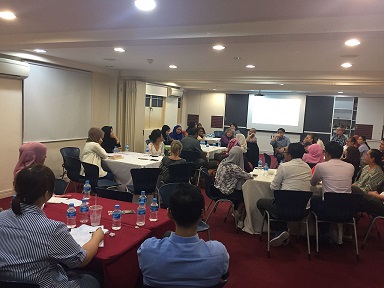-
Advocacy Theme
-
Tags
- Abortion
- Adoption
- Caregiving
- CEDAW
- Disability
- Domestic Violence
- Domestic Workers
- Harassment
- Healthcare
- Housing
- International/Regional Work
- Maintenance
- Media
- Migrant Spouses
- Migrant Workers
- Muslim Law
- National budget
- Parental Leave
- Parenthood
- Polygamy
- Population
- Race and religion
- Sexual Violence
- Sexuality Education
- Single Parents
- Social Support
- Sterilisation
- Women's Charter
Ramadan Talks: How do gender roles shape Muslim families?
June 22nd, 2017 | Family and Divorce, Gender-based Violence, Muslim Women's Rights, News, Views
By Nurin Adila Shahrin, GEC volunteer
 GEC (Gender Equality is Our Culture) kick-started this year’s Ramadan Talks with an exploration of marriage education and gender roles in Islamic families. We had the pleasure of hosting Associate Professor Maznah Mohamad and Dr. Suriani Suratman from NUS, together with research assistant Fadiah Johari, who presented findings from their ongoing research on the curriculum of marriage preparatory courses in Malaysia and Singapore.
GEC (Gender Equality is Our Culture) kick-started this year’s Ramadan Talks with an exploration of marriage education and gender roles in Islamic families. We had the pleasure of hosting Associate Professor Maznah Mohamad and Dr. Suriani Suratman from NUS, together with research assistant Fadiah Johari, who presented findings from their ongoing research on the curriculum of marriage preparatory courses in Malaysia and Singapore.
A general theme that echoes throughout these courses is how responsibilities and expectations are different for husbands and wives. Some courses highlighted how the husband has to provide maintenance, protection, accommodation and security for the wife, while the wife is expected to beautify herself for the husband, protect the dignity and property of her husband, manage the house and children’s education, as well as obey her husband in all matters except those against Islamic laws.
There are some aspects in the local course curriculum that seek to promote an egalitarian outlook. One particular provider drew attention to how families can be financially disadvantaged if they strictly complied with the belief that the husband should be the sole breadwinner.
Participants spoke about the importance of understanding that gender roles are not fixed but should be discussed and negotiated within the families contextually. One astutely mentioned that it’s not about the husband merely “helping” the wife with chores but also bearing an equal share of the mental load of managing the household.
They also eagerly shared examples of less traditional gender roles within Islamic families – such as how the Prophet also did housework and how Khadijah, the first wife of the Prophet, was a very successful entrepreneur.
Others recommended stronger protections of women’s rights in marriage by adding on stipulations to the marriage contract. They also reiterated the view that tackling gender inequality also starts with the family – children should be raised without the imposition of gender stereotypes and gender roles. Participants also hoped that marriage preparatory courses in future could focus on the responsibilities of being a couple as a whole rather than dividing responsibilities based on gender.
Gender roles and stereotypes can lead to detrimental consequences. The assumption that men must be dominant and authoritative while women must be passive and submissive is often used as justifications for acts of violence against women. From the discussion, we see it remains, as always, important to constantly promote gender relations that emphasises equality and respect within families.



